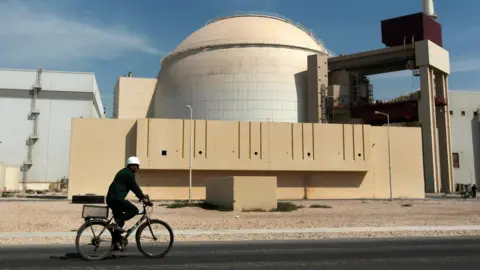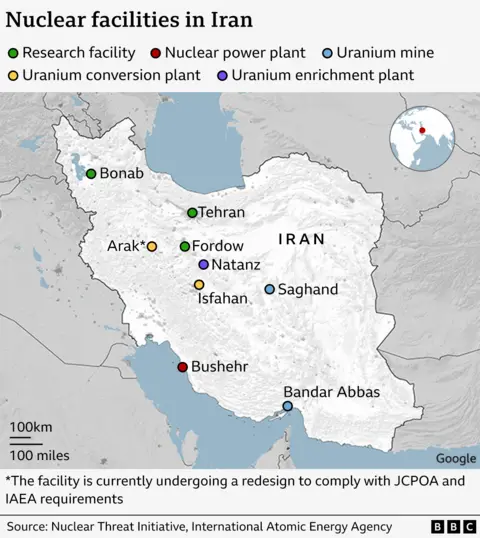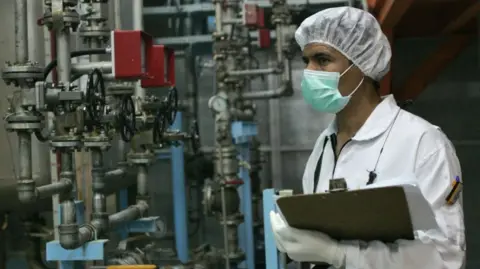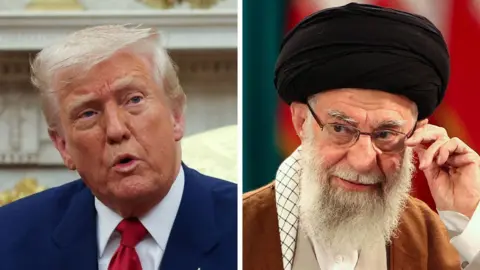What is Iran's nuclear programme and what does the US want?
 AP
APUS and Iranian officials have held indirect talks in Oman's capital, Muscat, to try to reach a new deal over Iran's controversial nuclear programme.
Donald Trump pulled the US out of a previous nuclear agreement between Iran and world powers in 2018, and reinstated economic sanctions, angering Iran.
The US president has warned of military action if the talks do not succeed.
Why isn't Iran allowed nuclear weapons?
Iran says its nuclear programme is for civilian purposes only.
It insists it is not trying to develop nuclear weapons, but many countries - as well as the global nuclear watchdog, the International Atomic Energy Agency (IAEA) - are not convinced.
Suspicions about Iran's intentions arose when the country was found to have secret nuclear facilities in 2002.
This broke an agreement called the Nuclear Non-Proliferation Treaty (NPT), which Iran and almost all other countries have signed.
The NPT lets countries use non-military nuclear technology - such as for medicine, agriculture and energy - but does not permit the development of nuclear weapons.

How advanced is Iran's nuclear programme?
Since the US pulled out of the existing nuclear deal - known as the Joint Comprehensive Plan of Action or JCPOA - in 2018, Iran has breached key commitments, in retaliation for the decision to reinstate sanctions.
It has installed thousands of advanced centrifuges (purification machines) to enrich uranium, something which was banned by the JCPOA.
Nuclear weapons require uranium which has been enriched to 90% purity. Under the JCPOA, Iran was only allowed to possess up to 300kg (600lb) of uranium enriched to 3.67% - sufficient for civilian nuclear power and research purposes but not nuclear bombs.
But by March 2025, the IAEA said Iran had about 275kg of uranium which it had enriched to 60% purity. That is enough to theoretically make about half a dozen weapons, should Iran further enrich the uranium.
US officials have said they believe Iran could turn that uranium into enough weapons-grade material for one bomb in as little as a week. However, they have also said it would take Iran between a year to 18 months to build a nuclear weapon. Some experts say a "crude" device could be built in six months or less.
Why did Trump pull out of the nuclear deal?
The UN, US and EU imposed extensive economic sanctions on Iran from 2010, over suspicions that its nuclear programme was being used to develop a bomb.
The sanctions stopped Iran from selling oil on international markets and froze $100bn (£77bn) of the country's foreign assets. Its economy plunged into recession and the value of its currency fell to record lows, which in turn caused inflation to soar.
In 2015, Iran and six world powers – the US, China, France, Russia, Germany and the UK – agreed to the JCPOA after years of negotiations.
As well as limiting what Iran was permitted to do with its nuclear programme, it allowed the IAEA to access all of Iran's nuclear facilities and to carry out inspections of suspect sites.
In return, the powers agreed to lift the sanctions.
The JCPOA was set to last up to 15 years, after which the restrictions would expire.
 Getty Images
Getty ImagesWhen Donald Trump took office in 2018, he removed the US – which had been a key pillar of the agreement.
He said it was a "bad deal" because it was not permanent and did not address Iran's ballistic missile programme, amongst other things. Trump re-imposed US sanctions as part of a "maximum pressure" campaign to compel Iran to negotiate a new and expanded agreement.
Trump's decision was influenced by America's regional allies who were opposed to the deal, chiefly Israel.
Israel claimed that Iran was still pursuing a covert nuclear programme, and warned that Iran would use billions of dollars in sanctions relief to strengthen its military activities.
What do the US and Israel want now?
Trump's announcement concerning talks with Iran appeared to take Israel by surprise. He had long said he would make a "better" deal than the JCPOA, though up till now Iran has rejected renegotiating the agreement.
Trump has previously warned that if Iran did not make a new deal "there will be bombing".
His national security adviser Mike Waltz has said that Trump wants the "full dismantlement" of Iran's nuclear programme, adding: "That's enrichment, that is weaponisation, and that is its strategic missile programme."
Iran hopes a deal to limit, but not dismantle, its nuclear programme in exchange for sanctions relief.
"Our intention is to reach a fair and honourable agreement from an equal position," Iranian Foreign Minister Abbas said.
Although Trump had said there would be "direct talks", Araghchi said the negotiations in Oman were indirect, with only a brief conversation between him and US envoy Steve Witkoff taking place as they were leaving.
Araghchi said Iran was ready to engage with the US, but that Trump must first agree there can be no "military option".
 Reuters / Getty Images
Reuters / Getty ImagesAfter Trump's announcement, Israel's Prime Minister Benjamin Netanyahu said the only acceptable deal would involve Iran agreeing to eliminate its nuclear programme. He said that meant: "We go in, blow up the facilities, and dismantle all the equipment, under American supervision and execution."
Israel's biggest fear will be that Trump might accept a compromise short of Iran's complete capitulation which he could present as a diplomatic win.
Israel, which has not signed the NPT, is assumed to have nuclear weapons, something it neither confirms nor denies. It believes a nuclear-armed Iran, which does not accept Israel's right to exist, would pose a substantial threat.
Could the US and Israel attack Iran?
Both the US and Israel have the military capabilities to bomb Iran's nuclear infrastructure, but such an operation would be complex and risky, with an uncertain outcome.
Key nuclear sites are buried deep underground, meaning only the most powerful bunker-busting bombs could possibly reach them. While the US possesses these bombs, Israel is not known to.
Iran would almost certainly defend itself, which could include attacking US assets in the region, and firing missiles at Israel.
For an operation of this kind, the US would likely need to use its bases in the Gulf, as well as aircraft carriers.
But countries like Qatar, which hosts the biggest US airbase, might not agree to help it attack Iran, fearing retaliation.
